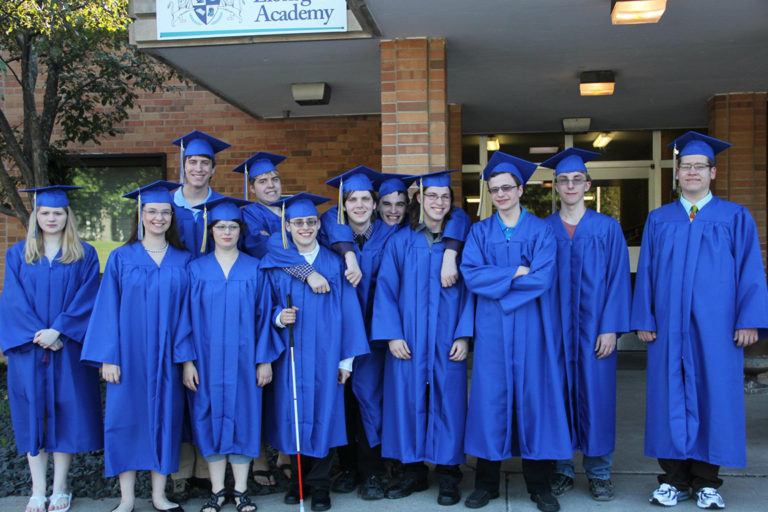Lionsgate Academy

Lionsgate Academy is a public charter school, open to all students—but is designed to meet the unique needs of students living with Asperger’s syndrome and those on the autism spectrum during grades 7 through 12. Lionsgate offers core academic classes, with additional training services such as social skills, occupational therapy, speech-language skills, and transition skills.
The school was started by two women— Bernadette Groh R.N., M.S., P.H.N., and Tamara Phillips M.A., who were intrigued with idea that public schools could do a better job of educating teenage children living with autism.
They convened a meeting of experts and interested parties in late 2006. At that meeting, Steven Waisbren M.D., Ph.D., a father of a teen with autism and a surgeon in the community, was appointed chairman of the newly-formed board of directors. “He recruited relentlessly,” Ron Berger, Lionsgate’s Director of Finance and Operations told us. “One of the reasons the school got started is because you can’t say no to Steven Waisbren!”
Lionsgate Academy began to hire staff and recruit families, but faced a number of challenges. Families couldn’t commit until they knew the location of the school. Bus companies couldn’t commit until they know the school’s hours and where students were located. And the administration couldn’t determine staffing needs until they understood the needs of the students. Despite the challenges, Lionsgate was able to open its doors for the 2008-2009 school year with 70 students.
“This was groundbreaking work in 2008,” Ron told us. “There were other schools doing autism work, but none of them, that we were aware of, had a general curriculum as the leading piece of their program. Their focus wasn’t on academic success. Ours was.”
Since 2008, Lionsgate has grown quickly, yet sustainably—from 70 students the first year, to around 160 today, thanks in part to the leadership of Dr. Diane Halpin, Lionsgate’s executive director since 2012. Diane brought a wealth of experience to the school—having worked in the greater Washington D.C. area, Hawaii, and the Twin Cities. She spent time as a research associate at the Institute on Community Integration where she has conducted research for the National Center on Educational Outcomes, the North Central Regional Resource Center, and the National Inclusion Project. Her work has included teaching at the high school, undergraduate, and graduate levels and she has served as a manager/director of programs in the defense industry, job training centers, and autism treatment centers.
But the year Diane joined Lionsgate was also the year that the state funding landscape had shifted; holdbacks were being implemented, which meant their cash flow would be affected by a delay in reimbursement from the State of Minnesota—where much of their funding comes from.
Ron and Diane had known about Propel Nonprofits (formerly Nonprofits Assistance Fund), and knew that they could find support to supplement their existing funding from Venture Bank, and to help even out cash flow to weather the storm.
“[Propel Nonprofits] came out, they looked at our mission, at the staff in place, and how we were running things,” Diane told us. “They had faith in us, and gave us a [line of credit] so we could make payroll when the state was making its accounting shifts. Without them, the growth rate for our school would’ve been much slower. We just wouldn’t have been able to sustain it.”
“I like to think we’re one of the only organizations that really understands what Ron has on his plate,” said Phil Hatlie, Lionsgate’s Loan Officer with Propel Nonprofits. “If nothing else, we can be a sounding board to help him better do his job. We like to take the pressure off so they can go do what they do best—working on their curriculum and continuing to run their successful school.”
Over the last two years, Lionsgate has expanded to a second site, remote from the main campus, and has developed a transition program for 18-21 year-olds. Their success means that their line of credit with Propel Nonprofits may not be necessary in the future—“but that doesn’t mean we’ll stop having a relationship with them,” Ron said.
“The nonprofit community in the Twin Cities would not be as robust and sound as it is without the people at Propel Nonprofits,” he continued. “And it’s not just the money—it’s the people. A lot of times people who do this mid-layer lending at banks are very institutional. They understand the money, but not the mission like Propel Nonprofits does. Whether we are borrowing from them or not, the team at Propel Nonprofits are people that I can just call to discuss issues—and that’s invaluable. They’re a special resource, and we’re fortunate to have them in our community.”
Related Services
-
Lending
Propel Nonprofits makes loans to a wide range of nonprofits of different sizes and fields of service to strengthen and expand programs, manage cash flow, and finance real estate projects. Our lending team determines the best approach to meet your needs, and sticks with you to address challenges.
